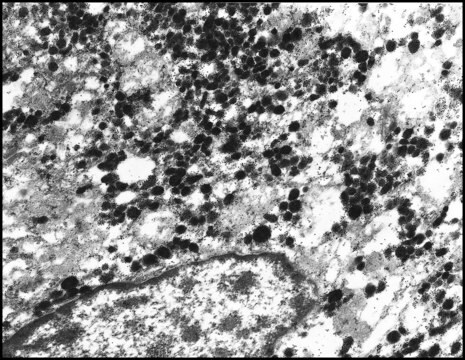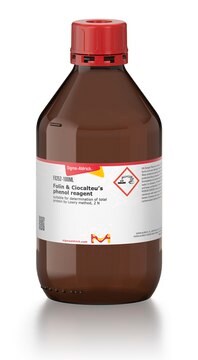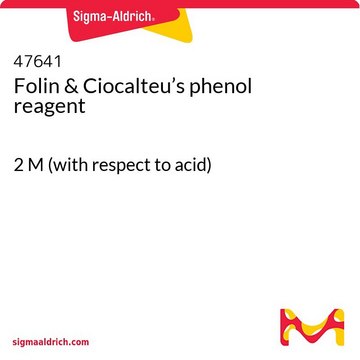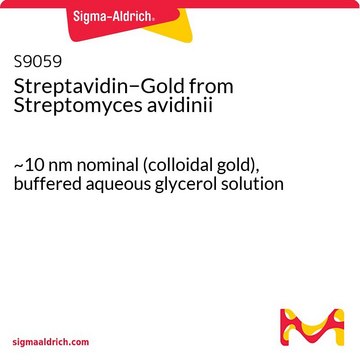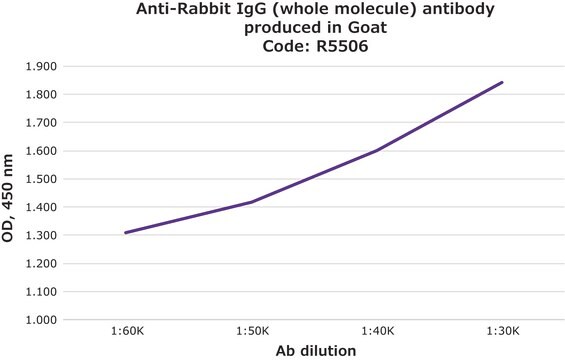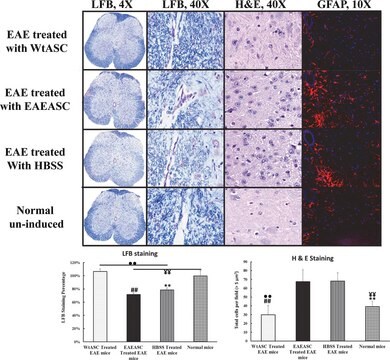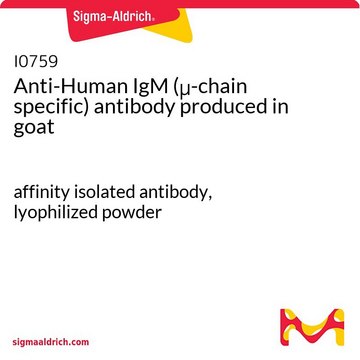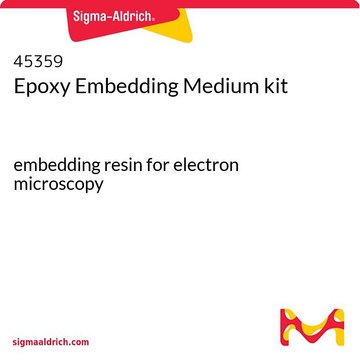おすすめの製品
由来生物
goat
結合体
gold conjugate
抗体製品の状態
affinity isolated antibody
抗体製品タイプ
secondary antibodies
クローン
polyclonal
形状
aqueous glycerol suspension
テクニック
dot blot: suitable
western blot: suitable
粒径
5 nm (colloidal gold)
保管温度
2-8°C
ターゲットの翻訳後修飾
unmodified
詳細
Goat polyclonal anti-Rabbit IgG (whole molecule)−Gold antibody binds all rabbit IgGs. It has no observed reactivity with human serum proteins.
Immunoglobulins (Igs) have two heavy (H) and two light (L) chains, held together by disulphide linkages. They belong to the immunoglobulin super-family. The heavy chain has one variable N-terminal region and three to four constant (CH1-CH4) C-terminal regions. The light chain has one variable and constant region. IgGs are subclassified into IgG1, IgG2, IgG3 and IgG4. The IgG gene is localised on rabbit chromosome 20. Gene conversion events are observed in rabbit IgG gene.
Rabbit IgG is a plasma B cell derived antibody isotype defined by its heavy chain. IgG is the most abundant antibody isotype found in rabbit serum. IgG crosses the placental barrier, is a complement activator and binds to the Fc-receptors on phagocytic cells. The level of IgG may vary with the status of disease or infection.
Immunogold labeling is a technique whereing antibodies, especially secondary antibodies, are labeled with colloidal gold. These gold conjugated antibodies generate electron dense particles that are visable using electron microscopy.
Immunogold labeling is a technique whereing antibodies, especially secondary antibodies, are labeled with colloidal gold. These gold conjugated antibodies generate electron dense particles that are visable using electron microscopy.
アプリケーション
Anti-Rabbit IgG (whole molecule)−Gold antibody produced in goat has been used in electron microscopic analysis of exosomes in glioma cells, clathrin proteins and retinal tissues.
Goat polyclonal anti-Rabbit IgG (whole molecule)−Gold antibody may be used as a primary or secondary antibody that enables the labeling of rabbit IgG for detection by electron microscopy.
生物化学的/生理学的作用
Digestion of IgG by papain results in generation of fragment antigen binding (Fab). Pepsin digestion of IgG results in fragment crystallizable (Fc). Fc regions of IgG antibody have enormous therapeutic potential and are exploited for the development of therapeutic antibodies. IgG1 class is the most abundant and its deficiency results in hypogammaglobulinemia. IgG2 deficiency increases susceptibility to bacterial infections. IgG3 mediates effector functions and IgG4 is associated with asymptomatic infection.
その他情報
本抗体は、ヒト血清タンパク質で吸収済です。
物理的形状
Colloidal suspension in Tris buffered saline, pH 8.2, with 30% glycerol (v/v), 1% bovine serum albumin (w/v), and 15 mM sodium azide.
免責事項
Unless otherwise stated in our catalog or other company documentation accompanying the product(s), our products are intended for research use only and are not to be used for any other purpose, which includes but is not limited to, unauthorized commercial uses, in vitro diagnostic uses, ex vivo or in vivo therapeutic uses or any type of consumption or application to humans or animals.
適切な製品が見つかりませんか。
製品選択ツール.をお試しください
保管分類コード
10 - Combustible liquids
WGK
WGK 3
引火点(°F)
Not applicable
引火点(℃)
Not applicable
個人用保護具 (PPE)
Eyeshields, Gloves, multi-purpose combination respirator cartridge (US)
適用法令
試験研究用途を考慮した関連法令を主に挙げております。化学物質以外については、一部の情報のみ提供しています。 製品を安全かつ合法的に使用することは、使用者の義務です。最新情報により修正される場合があります。WEBの反映には時間を要することがあるため、適宜SDSをご参照ください。
Jan Code
G7277-BULK:
G7277-.4ML:
G7277-2ML:
G7277-VAR:
試験成績書(COA)
製品のロット番号・バッチ番号を入力して、試験成績書(COA) を検索できます。ロット番号・バッチ番号は、製品ラベルに「Lot」または「Batch」に続いて記載されています。
この製品を見ている人はこちらもチェック
Zhiguang Chang et al.
Nature communications, 7, 11537-11537 (2016-05-07)
Neutrophil extracellular traps (NETs), composed primarily of DNA and proteases, are released from activated neutrophils and contribute to the innate immune response by capturing pathogens. Plasmodium falciparum, the causative agent of severe malaria, thrives in its host by counteracting immune
Exosomes from glioma-associated mesenchymal stem cells increase the tumorigenicity of glioma stem-like cells via transfer of miR-1587
Figueroa J, et al.
Cancer Research, canres-ca2524 (2017)
Simara Price et al.
Microbiology (Reading, England), 160(Pt 10), 2148-2156 (2014-07-11)
Collagen molecules are structural in nature and primarily found in eukaryotic, multicellular organisms. Recently, a collagen-like protein, TrpA, was identified and characterized in the marine cyanobacterium Trichodesmium erythraeum IMS 101, and it was shown to be involved in maintaining the
Localization of alphaA-Crystallin in Rat Retinal Muller Glial Cells and Photoreceptors
Zayas-Santiago A, et al.
Microscopy and Microanalysis, 24(5), 545-552 (2018)
Javier Figueroa et al.
Cancer research, 77(21), 5808-5819 (2017-09-01)
Tumor-stromal communications impact tumorigenesis in ways that are incompletely understood. Here, we show that glioma-associated human mesenchymal stem cells (GA-hMSC), a newly identified stromal component of glioblastoma, release exosomes that increase the proliferation and clonogenicity of tumor-initiating glioma stem-like cells
ライフサイエンス、有機合成、材料科学、クロマトグラフィー、分析など、あらゆる分野の研究に経験のあるメンバーがおります。.
製品に関するお問い合わせはこちら(テクニカルサービス)